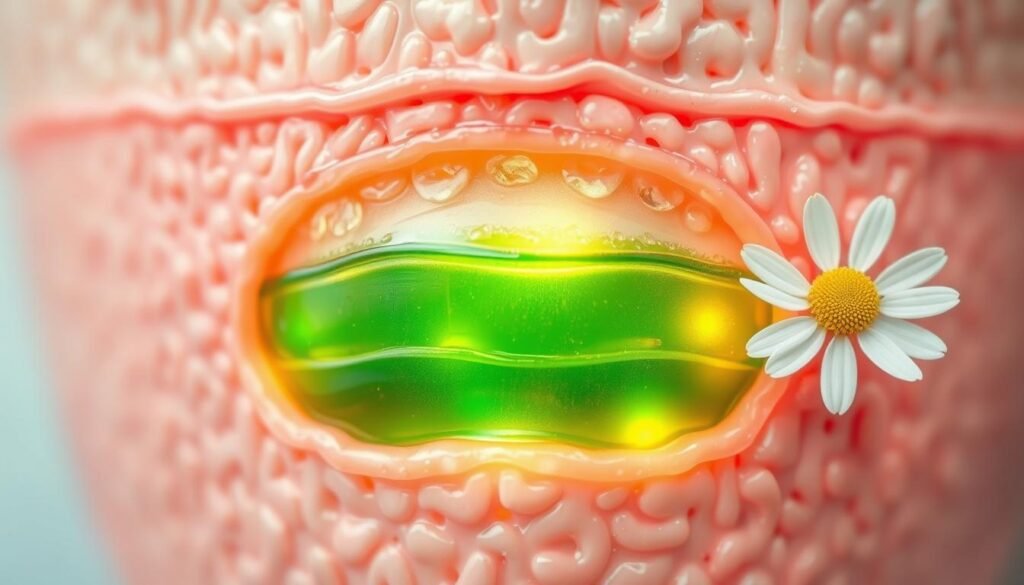Did you know that nearly 31.6% of adults in the United States are affected by eczema at some point? This highlights how common skin troubles are. Many suffer from skin conditions due to a weakened skin barrier. For those dealing with eczema, it’s vital to know the importance of skin barrier repair.
A damaged barrier leads to more sensitivity and worse symptoms. This makes treating eczema properly very important. By using the right strategies and products, you can rebuild and keep a healthy skin barrier. This will help ease discomfort and boost your skin’s overall health.
Key Takeaways
- Over 31% of adults experience eczema at some point.
- A compromised skin barrier can worsen eczema symptoms.
- Skin barrier repair is necessary for sensitive skin solutions.
- Effective strategies are essential for maintaining skin health.
- Products geared towards skin barrier repair are crucial for managing eczema.
Understanding the Skin Barrier and Eczema
The skin barrier acts as a vital shield for our body, keeping bad stuff out and moisture in. It’s made of fats and proteins. This mix helps keep our skin healthy. When it works right, it stops allergens, pollution, and toxic substances while keeping skin moist.
Eczema makes the skin barrier weaker, making it easier for irritants and allergens to get in. This link between eczema and barrier problems shows why it’s key to understand their relationship. When the barrier is damaged, skin gets red, dry, and itchy. So, people with eczema need to focus on treatment plans that fix their skin barrier.
To find solutions, we need to know what hurts the skin barrier. Things like soap, hot water, and strong chemicals can remove natural skin oils. This makes eczema worse. A healthy skin barrier is crucial not just for handling eczema but for overall skin wellness. It leads to a happier life.
| Skin Barrier Function | Impact of Eczema |
|---|---|
| Prevents Loss of Moisture | Increased dryness due to impaired barrier |
| Blocks Environmental Irritants | Higher sensitivity to allergens |
| Maintains Skin Health | Impaired skin leading to inflammation |
| Supports Overall Skin Integrity | Compromised defense can lead to secondary infections |
What Causes Eczema?
Eczema comes from various factors. Knowing these helps people deal with their skin better. Things like genes and environmental triggers influence eczema greatly.
Common Triggers of Eczema
Many things can make eczema worse, causing discomfort. By knowing these triggers, one can adjust their lifestyle. Common triggers include:
- Allergens: Dust, pets, and pollen can cause reactions.
- Irritants: Soaps, detergents, and some fabrics irritate the skin.
- Weather changes: Cold, humidity, and rapid temperature changes may cause problems.
- Stress: Stress can impact skin health and bring on eczema.
The Role of Genetics in Skin Conditions
Genetics play a big part in eczema. If eczema runs in the family, you’re more likely to get it. This genetic link can make skin more sensitive and less protective. It helps to know about these genes to better manage eczema.
| Trigger Type | Common Examples | Impact on Eczema |
|---|---|---|
| Allergens | Pet dander, dust mites, pollen | Can lead to inflammation and itching |
| Irritants | Soaps, detergents, scratching | May compromise the skin barrier |
| Weather | Cold, hot, or dry conditions | Can trigger flare-ups |
| Emotional Stress | Anxiety, pressure | Can worsen symptoms |
Symptoms of a Compromised Skin Barrier
When your skin barrier is not okay, you might notice it feels dry. This dryness can make your skin irritated. It can also look red, showing it might be inflamed. These signs tell us the barrier, which protects your skin, is struggling.
Another bad symptom is feeling extreme itchiness. This itching is really hard to deal with. It might make you scratch a lot. Sadly, scratching just makes things worse, leading to even bigger skin problems.
It’s key to catch these symptoms early. If you see them, take good care of your skin. Use products that add moisture to help fix your skin barrier. For more tips, check out this resource on skin barrier health.
| Symptoms | Description |
|---|---|
| Dryness | Flaky skin often resulting from a lack of moisture. |
| Redness | Inflammation indicating irritation and possible infection. |
| Itchiness | Severe urge to scratch the affected areas. |
| Irritation | General discomfort and sensitivity in the skin. |
The Importance of Skin Barrier Repair
A healthy skin barrier is key for good skin. It shields us from bad elements and keeps moisture in. If you have eczema, it’s crucial to know how skin health and barrier are linked.
Why a Healthy Skin Barrier is Essential
A strong skin barrier helps keep moisture in and stops water loss. If it gets damaged, skin can become irritated easily. This problem can make eczema worse. So, it’s important to keep the skin barrier strong to keep skin moist and safe.
The Connection Between Eczema and Skin Barrier Function
There’s a clear link between eczema and how the skin barrier works. Eczema can weaken this barrier, leading to more dryness and irritation. Repairing the skin barrier can cut down on eczema flare-ups, helping to make the skin better overall.

Key Ingredients for Skin Barrier Repair
Understanding essential ingredients can greatly boost skin health, especially for those with eczema. Ceramides, cholesterol, and fatty acids are vital for the skin barrier. They help strengthen skin defenses and increase moisture retention.
Ceramides: The Building Blocks of Skin
Ceramides are lipids that help keep the skin moist and safe from harm. Using ceramide-rich products can make the skin barrier stronger. This protects against dryness and irritation. For more on these benefits, check out this article.
Cholesterol’s Role in Skin Health
Cholesterol is important for skin strength. It works with ceramides and fatty acids to help the skin function well. This ingredient keeps skin hydrated, making it soft.
Fatty Acids for Moisture Retention
Fatty acids are key for keeping skin hydrated. They fix and bolster the skin barrier to stop water loss. Adding fatty acids to skincare helps with hydration and skin repair. This makes them crucial for damaged skin barriers.
Recommended Products for Eczema Treatment
It’s key to find the right products for eczema. There are many brands that offer solutions. These are focused on fixing the skin’s barrier and making symptoms better.
Barrier Repair Creams to Consider
Barrier Repair Creams are very important. They make the skin barrier stronger. These creams have lipids and other helpful ingredients. They prevent the skin from losing moisture and feeling irritated.
Here are some great options:
- CeraVe Healing Ointment: A rich mix of ceramides and hyaluronic acid for deep hydration.
- Avene Cicalfate Restorative Skin Cream: It has healing elements that aid in soothing and protecting the skin.
- La Roche-Posay Cicaplast Baume B5: It provides antioxidant protection and aids skin recovery.
Moisturizers with Skin Lipids
Moisturizers containing essential skin lipids are really good for the skin. They boost hydration and help in skin repair. Here are some of the best picks:
- Vanicream Moisturizing Cream: Ideal for sensitive skin as it’s free from common irritants.
- Neutrogena Hydro Boost Gel-Cream: This gives your skin a moisture boost and locks it in. And it doesn’t leave a greasy feeling behind.
- Dermalogica Barrier Defense Booster: A powerful formula that helps strengthen the skin barrier.

Hydration Strategies for Sensitive Skin
Keeping your skin properly hydrated is key for those with sensitive skin. Effective daily routines are important for skin hydration. They prevent dryness and improve skin texture. A regular moisturizing schedule improves your skin’s condition.
Daily Hydration Routines
Here are some tips for hydrating sensitive skin:
- Apply a gentle, fragrance-free moisturizer twice daily, preferably after cleansing.
- Incorporate a hydrating serum containing humectants in the morning and evening.
- Stay hydrated by drinking plenty of water throughout the day.
- Consider using a humidifier, especially in dry environments, to add moisture to the air.
The Role of Humectants in Skincare
Humectants like glycerin and hyaluronic acid are key for sensitive skin. They draw moisture into the skin, keeping it plump and hydrated. Using products with humectants fights dryness and supports a healthy skin barrier.
For detailed hydration tips, visit this resource. It’s crucial to choose suitable products and routines for sensitive skin to get the best results.
Preventing Eczema Flare-Ups
To prevent eczema effectively, it’s key to know what triggers your flare-ups. Everyone is different and may be sensitive to various triggers. By figuring out these triggers, you can better manage your symptoms and keep your skin healthy. Watch out for common triggers like:
- Food allergies or intolerances
- Environmental irritants such as dust, pollen, or pet dander
- Certain fabrics, like wool or synthetic materials
- Changes in temperature or humidity
Identifying Personal Triggers
Writing down what you eat and where you go can help find what causes your eczema flare-ups. Looking for patterns in what you eat or where you’ve been can help you change your daily life. This can make life more comfortable for people with eczema.
Creating a Skin-Friendly Environment
Creating a space that’s good for your skin can really help reduce redness and itchiness. You can do this by:
- Choosing soft, breathable clothes made from natural materials.
- Picking cleaning products that are free of scents and gentle on the skin.
- Using humidifiers or dehumidifiers to keep the air in your home just right.
- Finding the best moisturizers for sensitive skin and using them in your daily skin care.

Lifestyle Changes to Support Skin Health
Making changes in your lifestyle can greatly help with eczema. These changes include eating better and managing stress well.
Diet and Nutrition for Eczema Sufferers
Eating right is key to controlling eczema. Adding certain foods can lower inflammation and heal the skin. Important foods are:
- Omega-3 fatty acids found in fish, flaxseeds, and walnuts promote skin elasticity.
- Antioxidants from fruits and vegetables help combat oxidative stress.
- Vitamins such as Vitamin E and C strengthen the skin barrier.
A varied diet with these nutrients is vital. It makes overall health better and boosts skin health.
Stress Management Techniques
Stress can make eczema worse. Using good stress management methods is helpful. These methods are:
- Mindfulness practices, such as meditation and deep-breathing exercises, promote relaxation.
- Regular physical activity helps release tension and improve mood.
- Establishing a regular sleep routine supports overall health and reduces stress levels.
Adding these practices to your day can be a big help. They create a healthier skin condition by cutting down on eczema triggers.
Professional Treatments and Consultations
Understanding your options for professional eczema help is key. A Dermatologist Consultation can offer advice based on your specific situation. It’s important to know when this type of help is needed. This is especially true if store-bought treatments aren’t working.
When to See a Dermatologist
Here are reasons to see a skin expert:
- Experiencing severe or persistent eczema symptoms.
- Noticing signs of infection with eczema flare-ups.
- Having trouble controlling your eczema with usual treatments.
- Seeking advice on the best skin care products for eczema.
Innovative Eczema Treatments to Consider
New treatments in dermatology are giving hope to those with tough eczema. Here are some to consider:
- Biologics: These therapies target specific parts of the immune system to tackle eczema.
- Phototherapy: This involves using UV light to lessen inflammation and help the skin.
- Systemic medications: These are pills or injections aimed at managing tough eczema cases.
Knowing about these advanced eczema treatments is empowering. It also helps when deciding to see a dermatologist for your eczema.
Skin Barrier Repair: Tips and Best Practices
Keeping your skin barrier healthy is key. It involves a dedicated and specific approach. Start with effective Daily Skincare Routine habits. They help fight eczema and repair the skin barrier. It’s important to be patient and consistent for the best recovery.
Daily Skincare Routine Essentials
A strong daily skincare routine is critical for eczema management. Here are essential tips:
- Use gentle, fragrance-free cleansers to avoid irritation.
- Apply moisturizers with ceramides and fatty acids after bathing to seal in moisture.
- Add hydrating ingredients like hyaluronic acid or glycerin for better moisture.
- Choose products made for sensitive skin to lessen bad reactions.
These Skin Barrier Repair Tips are crucial for skin care. Learn more about taking care of your skin here.
Long-term Maintenance Tips for Eczema Management
To keep skin improvements, continuous effort is needed. Here’s what you can do for lasting eczema management:
- Regularly see a dermatologist to update your skin care plan.
- Eat foods high in omega-3 fatty acids for internal skin support.
- Reduce stress through yoga or meditation to prevent flare-ups.
- Be aware of eczema triggers like harsh chemicals or allergens.
Mixing these practices into your daily routine helps with immediate issues and long-term eczema management. This full approach leads to healthier skin over time.
Conclusion
To manage eczema well, it’s about knowing and using good skin care methods. This article pointed out how important ceramides, fatty acids, and cholesterol are. They keep skin healthy. By focusing on these, people can fight eczema’s discomfort better.
The advice shared here helps build a strong Eczema Management Strategy. It’s about knowing what triggers eczema and how to live better to avoid it. With the right info, anyone can make a skincare plan. This plan helps healing and makes skin look and feel great.
Taking an active role in skin health does more than just improve how we look. It makes our daily lives more comfortable. This guide aims to help those dealing with eczema. It shows that with the right knowledge and tools, a comfortable, confident life is possible.